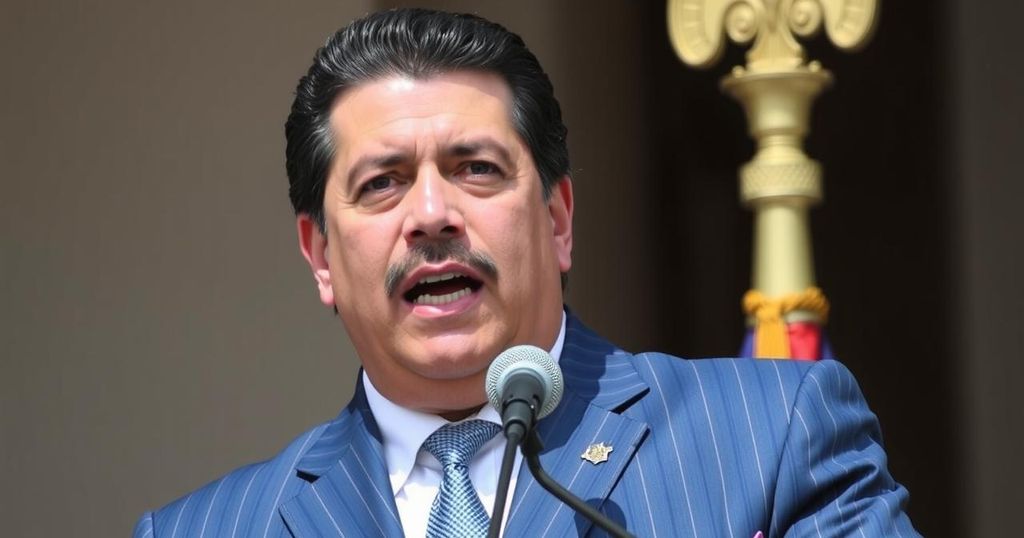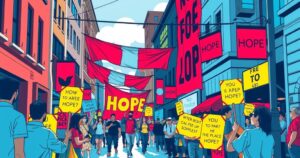Nicolás Maduro Sworn in as Venezuelan President Amidst Election Controversy

President Nicolás Maduro was sworn in for a new term despite credible evidence indicating his opponent won the recent election. Security forces clashed with opposition leaders and protesters, leading to detentions and violence. Allegations of electoral fraud have sparked national and international outrage, with continued repression against dissent raising concerns for democracy in Venezuela.
Venezuelan President Nicolás Maduro has been sworn in for another term until 2031, a move that has sparked widespread controversy due to allegations of election fraud and the suppression of dissent. Despite evidence indicating that his opponent, Edmundo González, won the recent election, Maduro’s administration declared him the victor shortly after the polls closed. As protests erupted in Caracas, the political atmosphere remained charged, with opposition leader María Corina Machado facing intimidation and brief detention by security forces.
On the day of his inauguration, the legislative palace was heavily secured with police, military, and intelligence personnel, while pro-Maduro supporters gathered nearby. The political tension escalated as Machado addressed a rally demanding González’s acknowledgment as president in place of Maduro. Reports emerged that Machado had been forcibly detained and her convoy assaulted, fuelling international concern for her safety. American political leaders, including President-elect Donald Trump, voiced support for the opposition, urging global attention on the actions of Maduro’s government.
Amid allegations of electoral manipulation and the absence of transparency, authorities in Venezuela have faced criticism for failing to provide adequate evidence to support Maduro’s claims of victory. The Carter Center, an independent observer, affirmed the validity of the opposition’s tallying of votes, which suggested a significant lead for González. The Venezuelan government’s heavy-handed approach in quelling protests resulted in widespread arrests and casualties among demonstrators, intensifying national unrest.
International condemnation of the Maduro regime continues, with few heads of state willing to attend the inauguration ceremony. Observers note that the political landscape in Venezuela remains precarious, particularly for opposition figures like González, who faces threats of arrest should he return from exile, compounded by alarming reports of kidnappings within his family. As the political crisis unfolds, concerns for human rights and the democratic process in Venezuela persist.
The political landscape in Venezuela has been characterized by profound turmoil, particularly surrounding the legitimacy of elections and the government’s treatment of opposition parties. Nicolás Maduro, who assumed the presidency in 2013 following Hugo Chávez’s death, has faced increasing scrutiny and allegations of electoral fraud, especially during the 2018 and 2021 elections. The opposition has consistently highlighted instances of voter suppression, intimidation, and irregularities within the electoral system. The detention of key opposition figures, coupled with the government’s failed promises to foster a fair political environment, has led to widespread national and international outrage, culminating in sustained protests against Maduro’s administration. As Venezuela navigates profound economic challenges and worsening humanitarian crises, the government’s escalated repression against dissenting voices raises concerns about the future of civil liberties and democratic governance in the country.
In conclusion, the swearing-in of Nicolás Maduro amidst credible allegations of electoral fraud and significant opposition protests underscores the ongoing political crisis in Venezuela. The situation highlights the stark division between Maduro’s regime and the opposition, led by figures like Edmundo González and María Corina Machado, who continue to advocate for democratic reforms and respect for human rights. The heightened repression, including arrests and intimidation against dissenters, indicates a troubling trajectory for Venezuela’s democratic prospects. International response and pressure will be crucial in addressing the humanitarian and political crises that afflict the nation.
Original Source: wsvn.com







